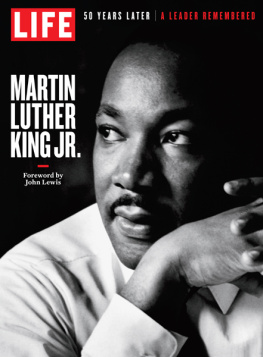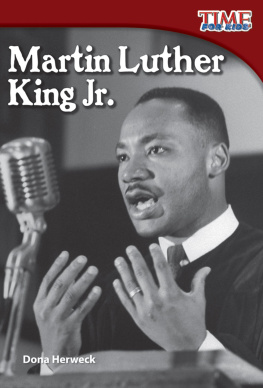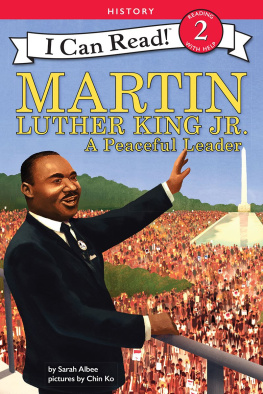Frye Gaillard
As I began reading the pages that followLewis V. Baldwins meticulous depiction of a fully human Martin Luther King, Jr.I found myself remembering the moment when I first saw Dr. King in person. It was April 12, 1963, Good Friday morning, and two white policemen were shoving him along a Birmingham sidewalk. They came within three feet of where I was standing, a white teenager on a high school field trip, only dimly aware of events in that citadel of southern segregation. Already, the fire hoses and dogs had been unleashed, and as the protests lagged in uncertainty and fear, King, Jr. decided that he must go to jail himself. Whatever the risks, it was time, he thought, for a personal demonstration of resolve.
As for myself, I had simply stumbled upon the scene, oblivious to history, but deeply moved by the drama of the moment. The policemen, to me, were the embodiment of malice, one grasping the collar of King, Jr.s denim shirt, and the other pushing him roughly from behind. But it was King, Jr. himself that Ill never forget. Im not quite sure what I expectedperhaps some flash of anger or defiance, or maybe the fear I was feeling myself. What I saw, instead, in his large, dark eyes was a stoicism that seemed to shade into sadness, a face that was difficult to read, but clearly, not immune to the meanness on such conspicuous display.
That was the memory seared in my mind, and I later learned what happened nexthow King, Jr. was taken away to jail and locked in a claustrophobic cell. There, in the gloom of solitary confinement, he brooded over newspaper accounts of eight white ministers in Birminghamall of them known as racial moderateswho had publicly criticized his movement. They called his demonstrations ill-timed and his nonviolent philosophy a fraud, for his purpose, they said, was to provoke a violent response from racists, and to use the publicity to build support for civil rights. King, Jr. was troubled by the critique, and he set out to respond, scribbling notes in newspaper margins that were smuggled from his cell and pieced together by his staff. The result was his Letter from the Birmingham City Jailanother elegant demonstration of his ability to frame the public debate.
I guess it is easy, King, Jr. wrote, for those who have never felt the stinging darts of segregation to say, Wait. He went on to write: But when you have seen vicious mobs lynch your mothers and fathers at will and drown your sisters and brothers at whim; when you have seen hate-filled policemen curse, kick, brutalize and even kill your black brothers and sisters with impunity;... when you have to concoct an answer to your five-year-old son asking in agonizing pathos: Daddy, why do white people treat colored people so mean?;... when you are harried by day and haunted by night by the fact that you are a Negro, living constantly at tip-toe stance, never quite knowing what to expect next... ; when you are forever fighting a degenerating sense of nobodiness, then you will understand why we find it difficult to wait.
For me, the transcendent power of King, Jr.s message was forever linked to the vulnerability I saw in his face, and I discovered that others had similar perceptions. One day in 1977, I met King, Jr.s oldest daughter, Yolanda, on a movie set in Macon, Georgia. Yolanda, now deceased, was an actress, playing the part of Rosa Parks in a made-for-television movie about her father. I was working on a magazine article about the movie when Yolanda and I sat down to talk at the Georgia motel where she was staying. After a while, the conversation turned to Birmingham, which had been a place for such tragedy and drama, and she recounted a day when she was not yet eight and the telephone rang at the King home in Atlanta, bringing a horrifying piece of news.
On this particular Sunday morning, September 15, 1963, a bomb had exploded at the Sixteenth Street Baptist Church in Birmingham, killing four young girls, and Yolanda remembered her fathers very human response. I had never seen him so depressed, she said. For several hours, Yolanda remembered, King, Jr. seemed almost catatonic, sitting alone in his office, head in his hands, brooding in silence. This was segregation stripped bare, revealing the violence that lay at its heartand, in a sense, the white ministers who had questioned King, Jr.s tactics were right. King, Jr. had intended to expose that ugly stain, to put it on full and hideous display for all the world to see more clearly. But he had never imagined that this would be the costfour girls barely older than his daughter killed, precisely because of his movement.
Eventually, Yolanda explained, her father pulled himself together, for he knew he must, and he traveled to Birmingham to preach the eulogy for the girls. History has proven over and over again, King, Jr. declared, that unmerited suffering is redemptive. So in spite of the darkness of this hour, we must not despair. We must not become bitter, nor must we harbor the desire to retaliate with violence. We must not lose faith in our white brothers. Somehow we must believe that even the most misguided among them can learn to respect the dignity and worth of all human personalities. Once again, the sheer depth of his human spirit proved indomitable.
Again and again through the years, when I had occasion to write about King, Jr. and his movement, those who knew him best would tell stories juxtaposing his humanityhis frailties, doubts, and vulnerabilities, and his delights in the ordinariness of lifewith his extraordinary gifts as a leader. R. D. Nesbitt, a deacon at the Dexter Avenue Baptist Church in Montgomery, would remember a visit to Atlanta in the fall of 1953. Nesbitt had been sent by his own congregation to gauge King, Jr.s interest in becoming the new minister at Dexter Avenue, and when he arrived at two in the afternoon, he found King, Jr. eating a plate of pork chops. King, Jr. was polite as they talked about the job in Montgomery, but to Nesbitt, at least, he seemed more interested in the food. Nesbitt remembered being puzzled by that, perhaps even a little put off, but on a January Sunday in 1954, King, Jr. came to preach a guest sermon at the church, and the effect was electric. The deacons offered him the job immediately, and King, Jr. accepted for a salary of $5,000 a year.






